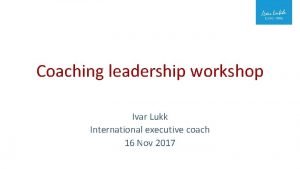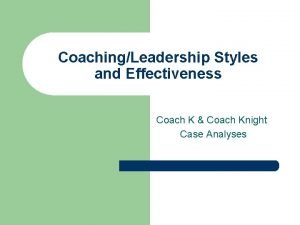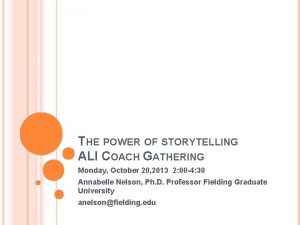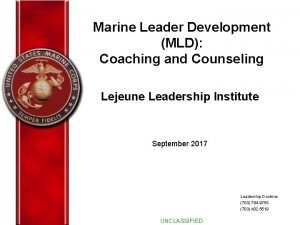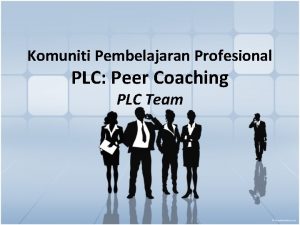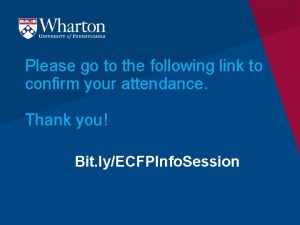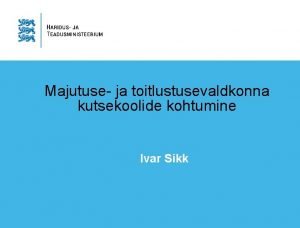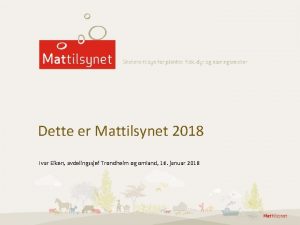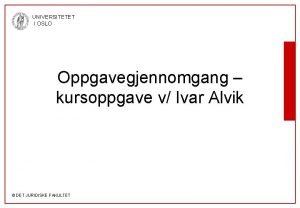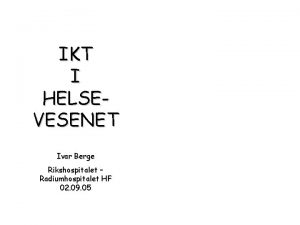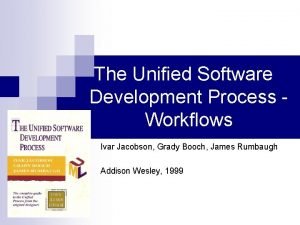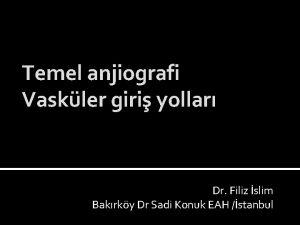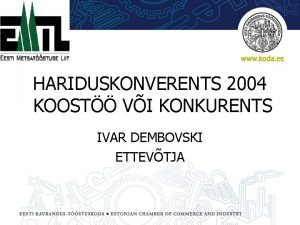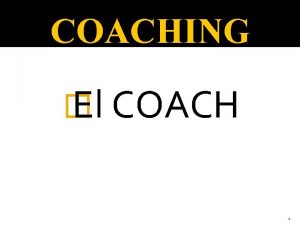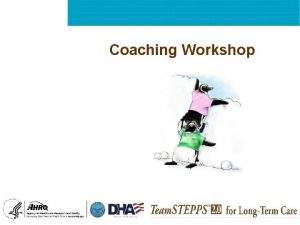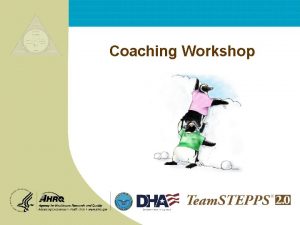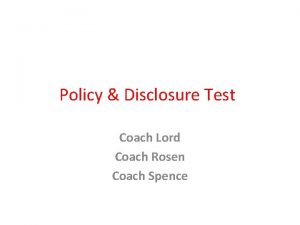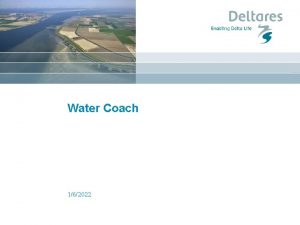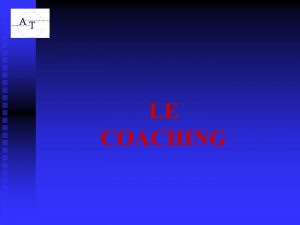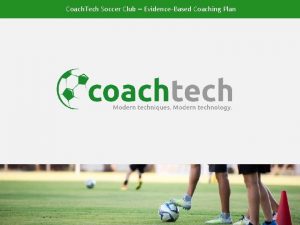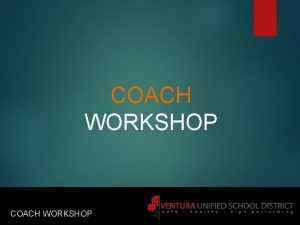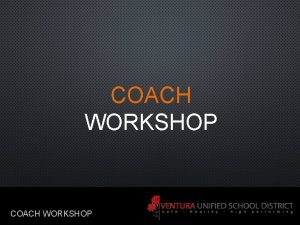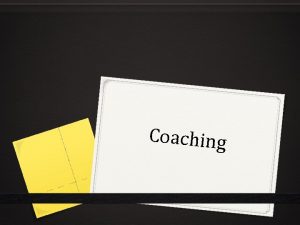Coaching leadership workshop Ivar Lukk International executive coach















- Slides: 15

Coaching leadership workshop Ivar Lukk International executive coach 16 Nov 2017

Origin and nature of coaching W. Timothy Gallwey: “Inner game takes place in the mind of the player, and it is played against such obstacles as lapses in concentration, nervousness, self– doubt and self-condemnation. In short, it is played to overcome all habits of mind which inhibit excellence in performance. ” John Whitmore: “Coaching is unlocking the person’s potential to maximize their own performance. It is helping them to learn rather than teaching them. ”

Coaching tools: Asking questions In daily life we ask questions to obtain information. We either want this information for ourselves or need it in order to be able to give advise. In the coaching world questions are asked in such a way that the other person finds answers, learns through this process and obtains self-confidence. Questions are also a great way to initiate constructive feedback, because each person is the best critic for himself or herself. Principles of questioning: Most often use open and probing questions. Closed questions mainly for summaries, actions and accountability. Consider leading effect of your questions.

Caching tools: Listening Level I: Internal Listening Attention is on ourselves—on the sound of our own inner voice. Listening to our own thoughts, opinions, judgments, feelings and conclusions. Level II: Focused Listening for words, expression, emotion, what they don’t say, values, vision, and what makes them energetic. Noticing body language, rhythm and tone of voice. Level III: Intuitive Listening Awareness includes everything: What you see, hear, smell, and feel. Gives greater access to your intuition. Being “in the flow”.

Coaching tools: Silence Keeping silence is one of the most difficult skills! Silence after asking a question is a sign that the other person seaches for an answer. Many people are impatient and do not give time for finding an answer. Instead they break the silence in order to “help the other person to find the answer” or try to reword the question. Doing this interferes in the thinking process and the result is not achieved. Keeping silence is a necessary skill in coaching. After asking a question you should not reword the question, not give advise or comment. You should allow time for finding the best answer! Longer silence brings about deeper discovery!

Caching tools: Keeping focus Coaching is result-oriented process. Role of the coach is to ensure that the coachee is focused on the objectives of the session. Great way keeping the process in track are interim summaries. Most impactful summaries are made by the coachee. Coach achieves these through questions, e. g: How would you summarize our progress so far? What have you learned about your ……… by now? Which one of the proposed solutions sound most compelling for you? What was the desired outcome of our session?

4 steps of the coaching conversation 1. Preparation Aim of the conversation. Belief in the coachee’s ability to find great solutions. How do create safe environment? 2. Defining the real problem and desired outcome Often under of the presented problem lays the real problem. Finding it is fundamentally important for the success of coaching. What situation would you want to achieve? 3. Exploring options Coach should help the coachee to brainstorm as many options as possible! 4. Decision and action Every coaching conversation should end with action-oriented decision.

Coaching session demonstration. Observer notes. What were the really impactful questions? Did you notice use of silence? When? How was focus kept? Did coach make summaries or led the coachee to summaries via questions? What steps of the coaching process did you notice?

Coaching experiment Guidelines: Coachee raises the topic Coach is NOT ALLOWED TO GIVE ADVICE! Coach talks max 20% of the time Session length 12 min

Predominant management style: Most efficient management style: Myths that Millennials require greater workplace recognition and guidance, and that they show less loyalty to the organizations to which they belong, have been largely debunked. Baird, C. H. (2015). Myths, Exaggerations and Uncomfortable Truths: The Real Story behind Millennials in the Workplace Source: Human Capital Institute “Building Coaching Culture with Millenial Leaders 2017”

Building a coaching culture % of organisations offering below 3 coaching modalities: NB! 51% of organizations have a dedicated line item for coaching in their training budget (31% in 2016) 37% of training budget for coaching initiatives Source: Human Capital Institute “Building Coaching Culture with Millenial Leaders 2017”

Indicators of coaching impact Source: Human Capital Institute “Building a Coaching Culture with Managers and Leaders 2016”

Growing selfconfidence Mentoring tool Building initiative Coaching leadership Learning amplifier Problem solving Motivation Creativity release

Discussion: how could coaching be applied in public administration?

Ivar Lukk www. ivarlukk. com info@ivarlukk. com +372 5177474
 Ivar lukk
Ivar lukk Coach k vs coach knight
Coach k vs coach knight Digital storyteller coach coaching
Digital storyteller coach coaching Why do we use coaching to develop marines
Why do we use coaching to develop marines Peranan coach dalam video how coaching works
Peranan coach dalam video how coaching works Lynn krage
Lynn krage Ivar sikk
Ivar sikk Mattilsynet trondheim
Mattilsynet trondheim Ivar alvik
Ivar alvik Ivar berge
Ivar berge Software process workflows
Software process workflows Juguler ven
Juguler ven Ivar dembovski
Ivar dembovski Ivar espelid
Ivar espelid Business ethics chapter 5
Business ethics chapter 5 Diversity executive leadership academy
Diversity executive leadership academy
